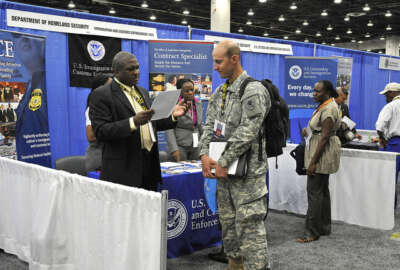

The Trump administration wants to find out how many people work, as in really work, rather than are employed, at the U.N., the State Department and other federal...
In 2006, the BBC correspondent at the United Nations asked the then-secretary general how many people worked at the UN? His reply was “about half.”
The Trump administration has made it clear that it wants to streamline the American delegation to the U.N. And the State Department, which largely supports its activities.
The president spent two days at the U.N. this week, addressing the General Assembly and also meeting with world leaders and assessing our operations there.
The idea is to cut staff and expenses. Depending on who does the counting, the American taxpayer pays between 22 percent and 27 percent of the cost of U.N. operations. Having people based in New York City, or visiting for meetings and conferences can be pricey. The White House and the new political team at the State Department said they want fewer people and less red tape, and more focus on issues of importance to the U.S., which pays much of the cost to keep the U.N. in business. At any given time, like this week, dozens, sometimes hundreds of people — mostly from D.C. — are leaving or arriving at a U.N. conference or meeting.
The administration’s goal is to focus on fewer things and only what it says is important to the American people. The decision to pull out of the Paris Accord, whether good or bad, was a shot heard around the diplomatic world. But it made the point that the White House isn’t kidding. This is not a drill.
So, could whatever is about to happen to the American staff and travel to the U.N. be a precursor of things to come for federal agencies deemed to have too many people in too many of the wrong places?
Earlier this week, we spoke with Ambassador Ronald Neumann, who is president of the American Academy of Diplomacy. Its core mission is strengthening American diplomacy.
As to the president’s promise to reshape the American presence at the U.N., Neumann said, “It shows they are thinking … but it’s hard to know if it is sensible or penny-pinching.”
He said the U.N. is like an office “where everybody thinks they should be at the meeting,” which accounts for a large number of people based in New York, as well as those who come up for a day or two. As to the size of the American mission, Neumann said, “It isn’t one size … It’s a shifting cast.” Putting a number on the size of the staff, he said, would be like trying to describe a movie by looking at a single frame. “But the meetings may still be important and we have to see if State is cutting numbers or business,” he said.
On the day we spoke, the ambassador said the academy was sending a letter to the White House and State Department asking them to outline their plan for the U.N. Previously, the academy has done studies and made recommendations about the staffing at the U.S. Agency for International Development and State Department.
Actor Wayne Knight was born in New York City.
Source: IMDB
Copyright © 2025 Federal News Network. All rights reserved. This website is not intended for users located within the European Economic Area.
Mike Causey is senior correspondent for Federal News Network and writes his daily Federal Report column on federal employees’ pay, benefits and retirement.
Follow @mcauseyWFED

